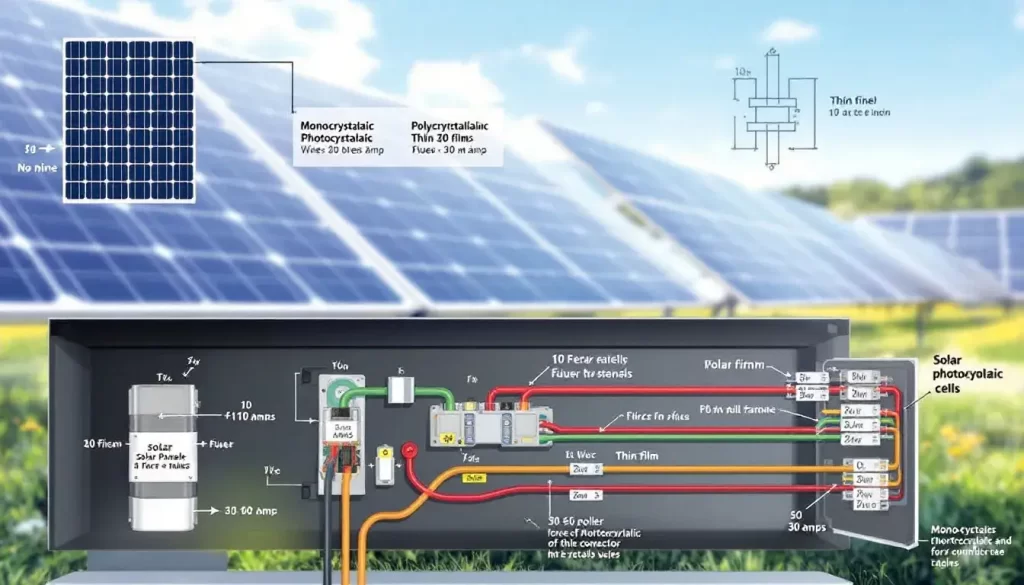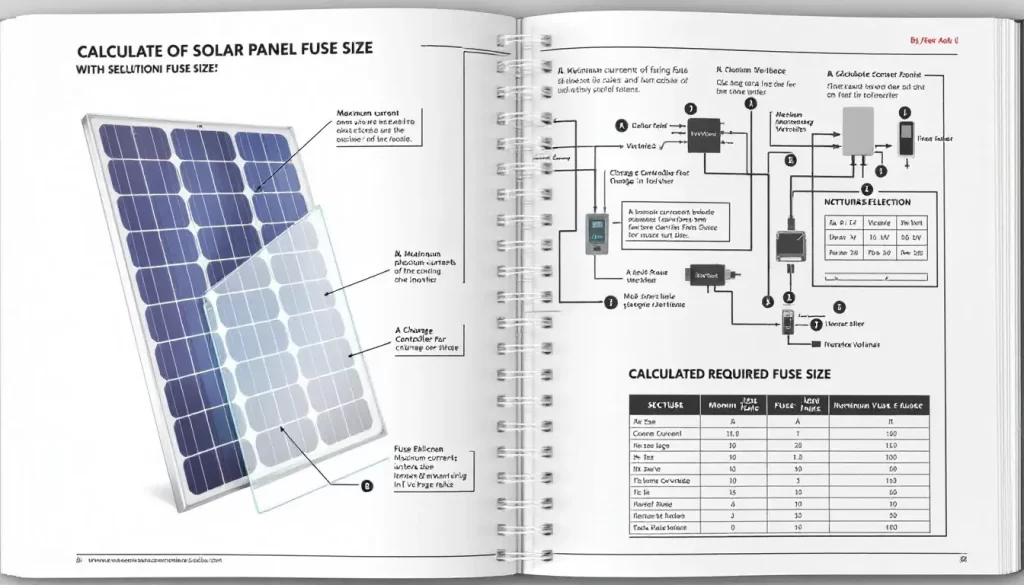Optimal Solar Panel Fuse Size: Ensure Your System’s Safety
Table of Contents
ToggleDetermining the appropriate solar panel fuse size is key to maintaining the safety and performance of your solar power system. This article will guide you through the process of calculating the right fuse size, helping you protect your investment and prevent electrical hazards.
Key Takeaways
- Solar panel fuses protect solar systems from electrical overloads and short circuits, preventing damage and ensuring safety.
- Calculating the correct fuse size involves using the formula Fuse Size = 1.25 × (Panel Wattage ÷ Voltage) and considering the panel’s short-circuit current (Isc).
- A proper fuse installation prevents overheating and fire hazards, safeguarding the solar array’s performance and longevity.
Understanding Solar Panel Fuses

Solar panel fuses are essential for safeguarding your solar panel system. They protect against:
- Electrical Overloads: Prevents too much electricity from flowing through your system.
- Short Circuits: Stops the flow of electricity if there’s a fault, protecting your equipment.
Why Proper Fusing is Important
- Protects Your Investment: Using the right fuse prevents equipment damage and ensures your system runs efficiently.
- Safety First: A correctly sized fuse acts as a first line of defense against electrical issues.
How to Determine the Right Fuse Size
- Consider Typical Operating Current: Understand the normal current your solar panels use.
- Check Short-Circuit Current (Isc): This is usually labeled on the panel.
- Add a Safety Margin: Ensure the fuse can handle normal currents plus any unexpected spikes.
Benefits of Proper Fusing
- Prevents Overheating: Reduces the risk of fire hazards.
- Protects Equipment: Keeps your solar panels, wiring, and charge controller safe.
Calculating the Correct Fuse Size for Your Solar Panels

Calculating the correct fuse size for your solar panels is essential to ensure safety and efficiency. Here’s how you can do it simply:
- Know Your Panel’s Short Circuit Current (Isc): This is the maximum current your panel can produce and is usually labeled on the panel. For example, a 400-watt solar panel operating at 12V typically has an Isc of about 33.3A.
- Use the Basic Formula: The formula to determine the fuse size is Fuse Size = 1.25 × (Panel Wattage ÷ Voltage). For a 400-watt panel, this means using a 40A fuse. This ensures the fuse can handle regular currents and unexpected spikes.
- Understand the Importance of Proper Fusing: Properly sizing your fuse prevents overcurrent issues, protecting your equipment from damage or fire hazards. It ensures your solar array works safely and efficiently.
- Example Calculation: For a 200W solar panel operating at 12V, the typical operating current is around 16.7A. Using the formula, the recommended fuse size is about 25A. This provides enough protection and keeps the system within safe limits.
By applying these steps, you can easily determine the right fuse size for any solar panel setup, whether it’s a single panel or a full solar array. This helps keep your solar PV system safe from electrical hazards and ensures it runs smoothly.
Summary
Properly fusing your solar panel system is crucial for protecting your investment and ensuring optimal performance. By understanding the role of solar panel fuses and calculating the correct fuse size, you can prevent electrical overloads and short circuits.
This step extends equipment lifespan and mitigates hazards like overheating and fire. Determining the appropriate fuse size ensures your solar PV system operates safely, providing reliable renewable energy for years to come.
Tel: +86-577-88671000
E-mail: ceo@tosun.com
Skype: tosunelectric
Wechat: +86-139 6881 9286
WhatsApp: +86-139 0587 7291
Address: Room No.1001 Wenzhou Fortune Center,Station Road, Wenzhou, China
REQUEST A QUOTE
WhatsApp us
 : +86-139 0587 7291
: +86-139 0587 7291 English
English Español
Español Русский
Русский Français
Français العربية
العربية Português do Brasil
Português do Brasil Українська
Українська Türkçe
Türkçe Polski
Polski Nederlands
Nederlands Italiano
Italiano Bahasa Indonesia
Bahasa Indonesia हिन्दी
हिन्दी اردو
اردو አማርኛ
አማርኛ Հայերեն
Հայերեն ไทย
ไทย Монгол
Монгол فارسی
فارسی Shqip
Shqip Ελληνικά
Ελληνικά


